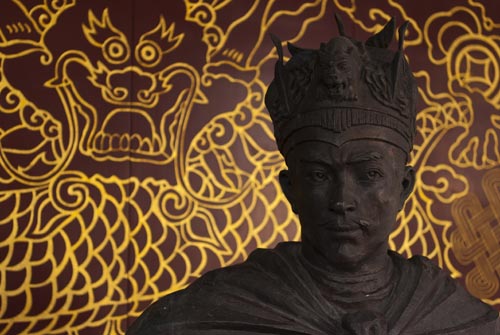<Back to Index>
- Field Marshal of the Taiping Rebellion Li Xiucheng, 1823
PAGE SPONSOR

Li Xiucheng (Chinese: 李 秀成; 1823 – August 7, 1864) was an eminent military leader of the Taiping Rebellion, and known during his military tenure as the Loyal King (忠王). This title was given because a Qing general attempted to bribe him to kill Hong Xiuquan, but he refused and told Hong Xiuquan. His many victories also made Hong very happy at "Loyal Prince Lee" by Western Sources. He served loyally under Hong Xiuquan's Taiping Administration and led Taiping forces to many military victories. He was executed by Zeng Guofan after interrogation in 1864. Li was the most important general during the latter part of the Taiping Rebellion.
The Army Group Jiangnan (江南大營) was a Qing army that encircled Nanjing. It happened twice, in the second encirclement the Qing army used 200,000 soldiers from March 1858, but it was routed by Li Xiucheng in May 1860. Li went on to occupy all of Jiangsu province except Shanghai.
Li Xiucheng's palace in Suzhou is the only one from the Taiping Rebellion that exists today. In July 1863, Li ordered his daughter's husband, Tan SauGuan, to take over control of Suzhou. But Li Hongzhang led the Why Army combined by the "Ever Victorious Army," which, having been raised by an American named Frederick Townsend Ward, was placed under the command of Charles George Gordon. With this support, Li Hongzhang gained numerous victories leading to the surrender of Suzhou.
The Chiang Donkey (蔣驢子) was Li Xiucheng's stable manager. Before the fall of Nanjing after three months in 1864, Li Xiucheng took his wealth, including much treasure, to Chiang Donkey and asked Chiang to take it out of Nanjing quickly and wait for Li Xiucheng somewhere. Chiang promised to do so and took the treasure carried by 20 horses and cow cart, but Li was executed at last. Thus, Chiang Donkey became rich in Nanjing after the civil war.
In Zhong Prince Li Xiucheng Describes Himself (《忠王李秀成自述》), the autobiographical account of a prince of the Heavenly Kingdom was written shortly before his execution.
When Li withdrew from Suzhou, his sword — the symbol of his power — was given to his young brother Li Shixian. Li Shixian took this sword but lost and was captured by Charles George Gordon in Liyang. When Charles George Gordon came back to the UK with Li's sword, he gave it to Queen Victoria's cousin's brother, chief commander of the military the Duke of Cambridge. He in turn gave the sword to his brother's daughter. On 30 August 1961 a professor of history at the University of London discovered this sword. He was very excited, certain that the sword had belonged to the great revolutionary Li Xiucheng. In 1981, this sword was returned to China and is currently stored in the National Museum of China.